|
|
| |
| |
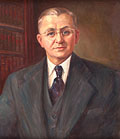 |
|
| |
 Frank
Dojacek (1880-1951), founder of Ukrainian Booksellers & Publishers Limited/
Winnipeg Musical Supply Co. Painting by Eugenia Greinert (1951), oil
on canvas. Frank
Dojacek (1880-1951), founder of Ukrainian Booksellers & Publishers Limited/
Winnipeg Musical Supply Co. Painting by Eugenia Greinert (1951), oil
on canvas.
|
|
| |
|
|
|
|
|
Frank Dojacek and Mail-order Shopping in the Prairies,
1906-1975
by Paul
Robertson
During the 19th and 20th centuries, thousand of East
Europeans
immigrated to Canada. Frank Dojacek, an emigrant from Bohemia, tapped into
this
huge market for foreign-language books and other products from the
"Old
Country." In addition to his retail, printing, and publishing
operations,
he established a lucrative mail-order business supplying new Canadians
with printed
materials in the language of their choice as well as other culturally
familiar
products.
Introduction | Frank Dojacek,
Bookseller
and Publisher | Central European Immigrants | Mail-order
Business | Bibles, Dictionaries, and Guide Books |
Printing
and Publishing Business | Musical Merchandise | Housewares
and Calendars | Patent Medicines and European Goods
|
Import Business | A Family Business
| The
Business in Decline | Ukrainian Booksellers Recreated
in Museum
Exhibit | Conclusion
|
Introduction
| |
 |
|
| |
 Main
window of Ruthenian (later Ukrainian) Booksellers and Publishers Ltd.,
ca 1918. The store's name is written in German, Ukrainian and Polish. Main
window of Ruthenian (later Ukrainian) Booksellers and Publishers Ltd.,
ca 1918. The store's name is written in German, Ukrainian and Polish.
|
|
| |
|
|
|
Alongside department store catalogues, specialist purveyors of
foreign-language
books and other items of particular interest to European immigrants
retailed
their wares by mail order. The availability of this type of merchandise to
these
first-generation Canadians played a key role in ensuring their cultural
survival
and integration into Canada.
Due to obvious differences in the language, culture, religion, and
societal
values of mainstream British Canadians, central European immigrants were
at a
particular disadvantage in Western Canada from the mid-1880s to the
mid-1910s.
In an effort to build communities that could maintain and strengthen links
with
people from their own world, new arrivals established churches and other
institutions.
However, adapting to the ways of the New World was that much more
difficult when
most sources of information were only available in English or French. How
were
homesteaders to get information about their new country if they could not
understand
the language?
|
Frank Dojacek, Bookseller and Publisher
By the late 1800s, Winnipeg had become the gateway to homesteads in the
West
for thousands of immigrants. A significant number stayed in the
city's
North End, a vibrant community of people of many origins, talents, and
interests.
One of these new arrivals was Frank Dojacek (František Dojacek), who,
in
1903, emigrated from Bohemia, a region now in the Czech Republic.
Originally
trained as a tailor, the environment in Winnipeg fostered his
entrepreneurial
skills.
| |
 |
|
| |
 Frank
Dojacek's family, ca 1930. Frank
Dojacek's family, ca 1930.
|
|
| |
|
|
|
Frank Dojacek soon realized that immigrants from central Europe
represented
a largely untapped market, especially for foreign-language books. At the
time,
most printed material in languages other than English or French were
imported
from Europe and there was no efficient means of distribution to people
isolated
on rural farms.
By 1904, Dojacek was peddling books door to door across the Prairies.
Within
two years he established a shop in the North End of Winnipeg and purchased
the
stock of John Bodrug, one of the first people to import books from Eastern
Europe.
|
Central European Immigrants
| |
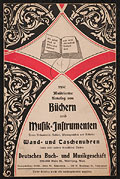 |
|
| |
 German
Book and Music Store Catalogue, 1937. German
Book and Music Store Catalogue, 1937.
|
|
| |
|
|
|
Although Dojacek was a Czech national, as an astute businessman he
recognized
the power of demographics. By far, his largest client base was ethnic
Ukrainians.
From 1891 to 1914, about 170 000 Ukrainians from Eastern Europe entered
Canada;
another 60 000 arrived between 1925 and 1934. In light of this, Dojacek
named
his business Ruthenian Booksellers and Publishers, "Ruthenian"
being
the more commonly used term to describe a Ukrainian at the time. The
store's
name was modified in 1920 to Ukrainian Booksellers & Publishers Ltd.
(Ukrainska
Knyharnia i Nakladnia) to reflect the changing identity of the Ukrainian
community
in Canada.
| |
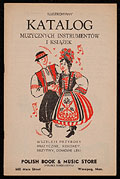 |
|
| |
 Polish
Book and Music Store Catalogue, ca 1950. Polish
Book and Music Store Catalogue, ca 1950.
|
|
| |
|
|
|
While acknowledging the importance of the Ukrainian community as a
client
base, Dojacek did not forget the other central European groups that made
up the
Western Canadian immigrant community. He built a bond with the consumer in
several
ways. In his advertisements to the German community, he referred to his
business
as the German Book and Music Store (Deutsches Buch- und
Musikgeschäft).
Likewise, Polish consumers shopped at the Polish Book and Music Store
(Polska
Ksiegarnia). Being fluent in seven languages himself, Dojacek ensured that
customers
in the shop were served in their own language. |
| |
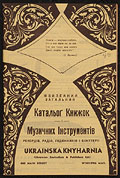 |
|
| |
 Ukrainian
Booksellers & Publishers Ltd. Catalogue, ca 1953. Ukrainian
Booksellers & Publishers Ltd. Catalogue, ca 1953.
|
|
| |
|
|
|
Mail-order Business
By way of mail-order catalogues printed in separate language editions,
Frank
Dojacek reached clients too far away to shop in his stores. Catalogues in
German,
Ukrainian, Polish, and Czech-Slovak were distributed to homes
throughout
the West. Although there were some categories of items common to all
versions
of his catalogues, he customised each edition to the target
community's
interests and needs.
|
Bibles, Dictionaries, and Guide Books
From the beginning, the mainstay of the Dojacek operation was an
extensive
inventory of multilingual printed materials, especially in German and
Ukrainian.
There were dictionaries, bibles and other religious books and documents,
political
books, novels, and books for children. Many publications addressed topics
relevant
to a new immigrant's adjustment to life in Canada: educational
primers
for adults, self-help books and guides covering home medical care, farming
practice,
and letter writing.
| |
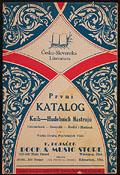 |
|
| |
 Book
and Music Store Catalogue, 1934, in Czech and Slovak. Book
and Music Store Catalogue, 1934, in Czech and Slovak.
|
|
| |
|
|
|
|
| |
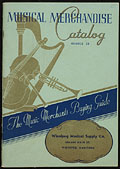 |
|
| |
 Winnipeg
Musical Supply Co. Catalogue, ca 1937. Winnipeg
Musical Supply Co. Catalogue, ca 1937.
|
|
| |
|
|
|
|
The primers were very popular adult educational tools, as many
immigrants
had not had extensive schooling before coming to Canada. By 1924, Frank
Dojacek
had sold 11 000 primers in ten editions. The Ukrainian-English
dictionary
he published had a sale of 10 000 copies. By 1944, the annual
catalogue
increased in size until the listing of Ukrainian dramatic works alone
comprised
600 titles.
|
Printing and Publishing Business
Frank Dojacek was also a shrewd businessman who owned his own printing
and
publishing company to supply his stores and catalogue operations.
Originally
located in the basement of his Winnipeg store, his printing operation
produced
many of the books that he sold in the store and by mail order as well as
newspapers
in Ukrainian, German, Polish, and Croatian. This business was later known
as
National Publishers Limited and was a leader in ethnic publications in
Canada.
Dojacek clearly understood the importance of these communication tools:
printed
information that could provide an immigrant with news of the homeland, a
piece
of literature, or perhaps some practical information for everyday living.
He
also knew that the full benefit of these materials could only be attained
if
they were available in a language that could be understood by the
reader.
|
Musical Merchandise
Within a few years, Dojacek supplemented his published offerings with
musical
instruments and supplies in recognition of the sales potential of another
important
central European cultural expression. In the early years of his business
in the
1910s and 1920s, he stocked an extensive range of accordions, harmonicas,
violins,
round-back mandolins, guitars, trumpets, and drums, as well as traditional
Slavic
instruments such as the tsymbaly (hammered dulcimer) and the balalaika.
As tastes changed, so did Dojacek's stock. By the 1930s he had
replaced
the old-style round-back mandolins with flat-back models and balalaikas
were
no longer offered. One item that remained in the catalogues for decades
was the
violin package that included the instrument, case and accessories and in
1953
was selling for $24.95.
|
Housewares and Calendars
| |
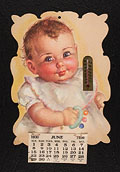 |
|
| |
 Wall
calendar, 1930. Wall
calendar, 1930.
|
|
| |
|
|
|
The various businesses grew steadily, but not spectacularly, in the
1910s
and 1920s. Dojacek survived the 1930s in large part due to his astute
business
sense. It is not clear when he first started publishing his catalogues,
but a
1918 edition offered a full range of books and other publications as well
as
a selection of musical instruments, sheet music and accessories, sewing
supplies
and household giftware, and other items for the home. The range of stocked
goods
increased gradually to include records and record players, radios, clocks,
pens,
appliances, jewellery, and toys.
A mainstay of the business in the 1970s was a wide offering of
decorative
and pictorial wall calendars depicting religious images, central European
patriotic
themes, literary works, scenic pictures, and images of children and
animals.
These were often fitted with renewable calendar pads so that clients could
keep
a favourite image year after year.
| |
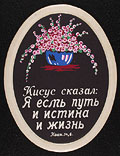 |
|
| |
 Decorative
paper wall plaque with scriptural quotation in Russian, 1940s. Decorative
paper wall plaque with scriptural quotation in Russian, 1940s.
|
|
| |
|
|
|
|
| |
 |
|
| |
 Violins,1934. Violins,1934.
|
|
| |
|
|
|
|
|
Patent Medicines and European Goods
In addition to being able to purchase items that they could read, new
immigrants
could always find culturally familiar household items through Ukrainian
Booksellers.
Patent medicines ("Blood Bitters," "Persia Balm,"
and
"Florida Water"), blade strops, scythes and sickles,
embroidery thread,
and religious items were imported directly from Europe. Dojacek avoided
competing
with mainstream Canadian department stores by concentrating his efforts on
merchandise
not generally carried by the larger companies. Stores such as the
Hudson's
Bay Company and Eaton's eventually realized the value of stocking
these
specialty items and came to him to obtain their supplies of blade strops
and
other wares.
|
Import Business
| |
 |
|
| |
 "Goliath" model
harmonica, M. Hohner, Germany, ca 1970. "Goliath" model
harmonica, M. Hohner, Germany, ca 1970.
|
|
| |
|
|
|
The buying and importing of goods for sale through Dojacek's
catalogue,
"Book & Music Stores," and the retail outlets was carried
on
through F. Dojacek Importers and Jobbers, whereas his retail operations
were
carried out under the names of Winnipeg Musical Supply Co. and Ukrainian
Booksellers
& Publishers Ltd. In time, at least in the Winnipeg area, Winnipeg
Musical
Supply became the more familiar name to customers.
| |
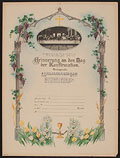 |
|
| |
 German
confirmation certificate. German
confirmation certificate.
|
|
| |
|
|
|
At its height, the mail-order business catered to customers in all
parts of
Canada and some areas of the United States. Shoppers making orders sent a
one-third-down
payment and paid the balance by Cash on Delivery (COD) when the
merchandise arrived
by mail. Processing COD orders required a great deal of clerical work,
however.
When staff was short, for example, during the Second World War, this
policy was
suspended and customers were requested to remit an approximate amount to
cover
the order; balances were refunded.
If an item could not be found in one of Dojacek's catalogues,
clients
could make special orders. Winnipeg Musical Supply catalogues (in English)
also
advertised a mail-order repair service for musical instruments and
phonographs,
but all work had to be shipped prepaid by the customer.
|
A Family Business
| |
 |
|
| |
 Children's
toys, 1948. Children's
toys, 1948.
|
|
| |
|
|
|
As Ukrainian Booksellers/Winnipeg Musical Supply grew as a business,
Frank
Dojacek opened adjunct branches in Edmonton, Regina, and Vancouver, often
under
the supervision of a member of his family. For Dojacek, community service
overlapped
his business. He often hired central European immigrants to work at the
store.
The presence of these immigrants on staff provided further familiarity and
comfort
to the central European customers. In turn, many of these staff members
had long
associations with the Dojacek business.
Dojacek's business remained family-run after his death. The
second generation
changed their name to Dojack to simplify it. The mail-order business
survived
into the 1970s, before telephone orders became common. Frank
Dojacek's
grandson Tom Dojack remembers his father Frank Dojack Jr. loading the
daily mail
order to take to the post office. He says the store's unofficial
motto
for mail order during this era was "no order was too small."
Ukrainian
Booksellers rarely disposed of unsold stock. Shelves of publications
printed
in the 1910s and 1920s remained in the basement storage when the store
closed
in the 1980s.
| |
 |
|
| |
 View-Master,
Sawyer's Inc., U.S.A., early 1950s. View-Master,
Sawyer's Inc., U.S.A., early 1950s.
|
|
| |
|
|
|
|
| |
 |
|
| |
 Patent
medicines. Patent
medicines.
|
|
| |
|
|
|
|
|
The Business in Decline
By the 1970s, sales changed. For example, some of the European
medicines that
had been sold for decades became suspiciously popular in the late 1970s.
That
was until the Manitoba liquor commission suddenly banned their sale!
| |
 |
|
| |
 Clocks
and watches, 1937. Clocks
and watches, 1937.
|
|
| |
|
|
|
By the 1970s, with changes in demographics and markets, the mail-order
business
was in serious decline. Although certain items such as the calendars, the
Ukrainian-English
dictionary, and harmonicas remained popular, sales had tapered off. This
change
can be traced to a number of causes. For instance, many items could be had
more
cheaply from other suppliers. Third-generation descendants of immigrants
born
in Canada who spoke fluent English no longer required the services of a
business
such as Ukrainian Booksellers. There was simply not the same demand for
multilingual
publications as there had been early in the century. With the improvement
of
transportation to move more goods westward and into rural areas, the
advent of
the shopping mall, and the migration of many people into urban centres,
residents
of the Prairies were not nearly as isolated as they had once been.
As a result, there was little need for a catalogue service to market
merchandise
by mail. The Winnipeg store, run since 1949 by Frank Dojack Jr.,
eventually found
itself a remnant of a former immigrant community that had long since moved
away
from its traditional home in the North End of the city. In 1984, two years
after
the death of Frank Jr., Ukrainian Booksellers quietly closed.
|
Ukrainian Booksellers Recreated in Museum
Exhibit
The Canadian Museum of Civilization has recreated an early 20th-century
version
of Ukrainian Booksellers in its permanent history gallery, Canada Hall. On
display
now are thousands of goods, publications, and catalogues once stocked by
the
business.
|
Conclusion
It has been argued that the mail-order catalogue ushered in the era of
mass
consumption in Canada, encouraging residents of rural areas to purchase an
ever-increasing
array of goods previously unavailable to them. In the case of Ukrainian
Booksellers,
its mail-order catalogue also provided an essential link with the outside
world,
and in particular, with the Old World.
The goods and services that Frank Dojacek was able to supply through
his stores
and catalogue business had several positive outcomes. As well as
strengthening
immigrants' bond with the Old Country and with other members of the
ethnic
community in Canada, they were effective at providing immigrants with
another
means of preserving their language, cultural ties, and traditions. Most
importantly,
they also acted as a measure for easing the difficult transition to the
ways
of a strange new land.
| |
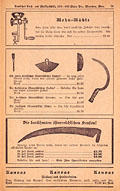 |
|
| |
 European
sickles and other tools, 1951. European
sickles and other tools, 1951.
|
|
| |
|
|
|
|
| |
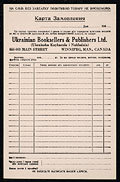 |
|
| |
 Ukrainian
Booksellers & Publishers mail-order form, 1940s. Ukrainian
Booksellers & Publishers mail-order form, 1940s.
|
|
| |
|
|
|
|
|
|
|